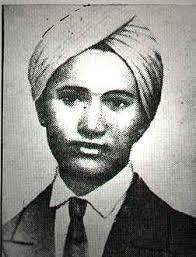
NOVEMBER 16 marks the 110th death anniversary of Kartar Singh Sarabha, a young martyr and one of the founding members of the Ghadar Party. November 3 marked the commencement of the centenary of the formation of the Naujawan Bharat Sabha, a youth organisation founded by Bhagat Singh and his compatriots. The youth front, supported by the Party observed this event in a befitting manner in Sarabha village, Ludhiana, Punjab on the November 3.
These two anniversaries should be appropriately commemorated by all our Party units through various programmes such as hall meetings, seminars on the role of youth in India’s freedom struggle against British colonialism, and public tribute events. A photograph of Kartar Singh Sarabha may also be displayed in all our offices to enable comrades to pay their respects.
You are requested to plan and implement suitable programmes, treating this as an opportunity to revive and promote the historic legacy of the young revolutionaries who sacrificed their lives for an independent and exploitation-free India. This should be contrasted with the complete absence of the RSS (which also completed one hundred years since its founding) and its affiliated organisations from the Independence struggle. Our mass organisations, particularly youth and student fronts, should also be encouraged to organise similar programmes among the sections in which they work.
Brief Life Sketch of Kartar Singh Sarabha
Kartar Singh Sarabha (May 24, 1896 – November 16, 1915) was only 15 years old when he became a member of the Ghadar Party and began participating in India’s struggle for independence. On November 16, 1915, he was executed by the British at the Central Jail in Lahore for his role in the freedom movement. He was just 19 years old at the time of his death.
Kartar Singh sailed to San Francisco in 1912 and joined the Ghadar Party upon its founding in 1913. He played an active role in the publication and distribution of the Ghadar newspaper. In 1914, he returned to India to organize a revolt against British rule. Arrested in Punjab in 1915, he displayed remarkable courage during his trial. He refused to confess and denied that the revolutionaries had engaged in any “conspiracy” against the British, instead describing their actions as an “open challenge” to colonial rule.
Bhagat Singh was deeply inspired by Kartar Singh Sarabha and always carried his photograph in his pocket. Bhagat Singh’s mother once recalled, “Bhagat Singh would show me that photograph and say, ‘Dear mother, this is my hero, my friend, and my companion’.”
Such was the revolutionary zeal and commitment of the young Kartar Singh Sarabha that his ideals continue to inspire generations. His sacrifice and patriotism must be remembered and propagated throughout the country.


